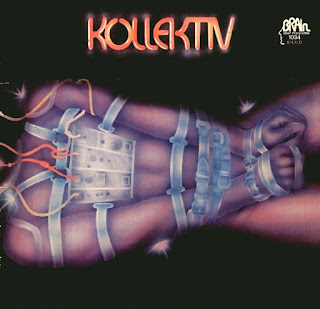Kollektiv – Kollektiv
Release date:1973
Genre: Krautrock
Also in 'Bluesology' was the talented jazz saxophonist Klaus Dapper who left the band along with Jogi. With Dapper at the helm, 'The Generals' changed style completely and changed name to 'Kollektiv', with the line-up of Dapper, Havix and the Karpenkiel brothers.
As a dedication to their roots 'Kollektiv's' debut album opened with the track "Rambo Zambo" sounding very close to the music of 'Organisation' and early 'Kraftwerk', a spacious fusion involving unusual structures, and strongly featuring electrified flute and saxophone, in all - too esoteric and complexly crafted to be called jazz-rock.
The band name was apt for a music that was created as a collective, with the attitude "Our maxim: Everything is allowed! Music as experiment", and in keeping with their novel music the LP cover had a novel word game inside based around the words: Rock, Jazz and Pop (or as my LP often says "RACK POZZ").
German humour can be so wicked, you know. In fact, along with the likes of 'Xhol', instrumental 'Thirsty Moon', 'Ibliss', et al., 'Kollektiv' exhibited a style that was uniquely German, the jazzier end of Krautrock, full of invention and exceptional musicianship.
- Rambo Zambo
- Baldrian
- Försterlied
- Gageg a)Andante
- Gageg b)Allegro
- Gageg c)Preßluft
- Jogi Karpenkiel - Bass
- Waldemar Karpenkiel - Drums
- Jürgen Havix - Guitar, Zither
- Klaus Dapper - Flute, Saxophone

























